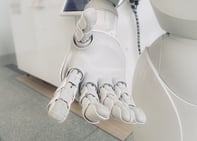Published on
Why Liberal Arts Graduates Will Survive the AI Apocalypse

“Artificial intelligence is no match for natural stupidity.” – Albert Einstein
As artificial intelligence (AI) proliferates at break-neck speed, many inside and outside higher education are left wondering what the future of work will look like. With growing fears of robots displacing increasing sectors of the economy, it is easy to see why some are becoming concerned about the job prospects for the next generation of college graduates. However, there is one group of graduates that I believe will likely survive the AI apocalypse, or at least the resulting labor market upheaval: liberal arts graduates.
Throughout history, there has been constant tension between people and machines when it comes to work. With each new invention, there has been a constant cycle of humans entrusting increasing amounts and types of their work to technology. This phenomenon originated with simple, repetitive physical activities, but has subsequently progressed to the extent that technology, particularly AI, is now capable of accomplishing what we might consider intricate cognitive tasks, encompassing complex statistical computation and language generation and recognition. Hence, the new AI revolution and the increasing anxiety that robots will essentially replace humans in all facets of work.
New and creative uses for AI seemingly arise every day. However, the effectiveness of AI is highly dependent on the quality of the inputs. In other words, AI is only as good as the questions and prompts that are posed to it by people. This is because the algorithms that power AI are designed to identify patterns and relationships based on the data that they are fed. If the questions being asked are too narrow or simplistic, the insights that are generated may be similarly limited. On the other hand, if the questions are broad and open-ended, the AI may be not able to provide any material specificity. As such, it is crucial for those working with AI to think carefully about the questions they ask and to consider the implications of the information that they are analyzing. This is where the liberal arts graduate comes in.
Despite their much-maligned and oft-questioned practicality, the liberal arts provide an education both broad and deep, one that covers not only a variety of disciplines such as literature, philosophy, and history but instills in its students a complexity of skills and competencies that make them best suited to work alongside AI. As Cremer and Kasparov (2021) highlight, in contrast to the limited responsiveness of artificial intelligence, human beings possess a distinctive capacity for envisioning, forecasting, experiencing emotions, and making evaluations in the face of evolving circumstances. This empowers them to transition their focus from immediate to long-term concerns. These faculties are exceptional to humans and do not rely on a constant stream of externally sourced data to function, as is required in the case of AI. Who better than a liberal arts graduate, then, to leverage such skills?
More specifically, one of the most significant skills refined in a liberal arts education is the development of critical thinking. As a matter of fact, in the recent National Associate of College and Employers (NACE) 2023 “Job Outlook,” surveyed employers ranked critical thinking only second to communicate with respect to the most important career competencies. When done well, liberal arts graduates are meticulously trained to analyze complex problems, think creatively, and question assumptions relentlessly. These skills will become increasingly important as automation assumes routine jobs, leaving humans to take on more complex tasks that require exceptional critical thinking and reasoning skills.
More specifically, while AI can analyze data and identify patterns with impressive speed and accuracy, it cannot generate new questions or ideas on its own. This is where liberal arts graduates have the potential to truly excel. With their broad knowledge base and finely-developed skills, they can ask the right questions and pose thoughtful generative statements that can help organizations move forward in new and innovative ways alongside AI.
Another area where liberal arts graduates can excel alongside AI is by being able to question the validity of outputs and identify errors inherent in contemporary AI. Despite its incredible potential, current AI technologies are still plagued by errors and limitations. These errors can arise from a variety of factors, including biased data sets, flawed algorithms, and imperfect machine-learning models. As AI continues to evolve and become more sophisticated, it will be essential to address these limitations so that the technology is being used in a responsible and ethical manner, and I believe the liberal arts graduate is best positioned to do so.
While the benefits of a liberal arts education are undeniable as it concerns the most ethical and effective uses of AI, it is incumbent upon higher education institutions to be explicit with their students about the skills and competencies they are gleaning from their education. Many students are still under the misconception that liberal arts degrees are less practical than their STEM counterparts, and may not fully appreciate the value of the skills they are developing. As such, it is crucial for institutions to emphasize the transferable nature of the skills inherent in a liberal arts education and to ensure that students understand the full value of their education in a rapidly changing world of work.
Institutions must make it clear to students that they are developing crucial skills such as critical thinking, communication, and problem-solving through their coursework. Rather than simply offering a broad array of courses, institutions should design their curricula in a way that ensures students develop these competencies throughout their education with an eye toward how humans and machines will work together in a new economy. This means explicitly incorporating activities and assignments that promote critical thinking, reasoning, cause and effect identification, communication, and collaboration, and providing students with ample opportunities to practice and develop these skills. More specifically, it means embracing AI in the classroom.
While AI has the potential to revolutionize many sectors of the economy, it is not a panacea. As machines become more intelligent and capable, there will be an increasing need for individuals who can ask the right questions, think creatively, and approach problems from multiple perspectives. They just so happen to be poets, historians, artists, and philosophers. By cultivating the skills and competencies inherent in such disciplines, liberal arts graduates will be well-positioned to navigate the challenges and opportunities presented by AI and thrive in an ever-changing labor market rapidly disrupted by technology. As such, our nation and its people should continue to invest in the liberal arts. By doing so, we can help to ensure that the next generation of graduates is prepared for the challenges and opportunities of the AI age.
References
Cremer, D.D. & Kasparov, G. (2021) AI Should Augment Intelligence, Not Replace It. https://hbr.org/2021/03/ai-should-augment-human-intelligence-not-replace-it
Author Perspective: Administrator



